![]()
Wednesday, July 29, 2015
This study is originally published by The Meir Amit Intelligence and Terrorism Information Center. The study is structured in four sections, which if read in conjunction with each other, draws a complete picture of the role of Palestinian activists and networks in Judea, Samaria and the Gaza Strip in the global BDS campaign.
The Circumstances of the BNC’s Establishment and its Participants
Inspired by the first Durban Conference, in 2004 a group of Palestinian academics and intellectuals organized in Ramallah, and in 2005 they joined the global campaign to boycott Israel. Initially the group was called the Palestinian Campaign for the Academic and Cultural Boycott of Israel (PACBI). It was headed by a then-unknown Palestinian activist named Omar Barghouti, who did not belong to the traditional political leadership or one of the Palestinian organizations. In the intervening decade he has intensively promoted the BDS campaign around the globe, and has become a kind of “celebrity” among anti-Israeli activists and networks. Omar Barghouti and other BDS activists claim the Palestinian call for BDS on July 9, 2005, was the real starting point of the campaign; they recently celebrated the campaign’s tenth anniversary.
In November 2007 the BNC, the BDS National Committee, was established in Ramallah. According to its website, it currently includes 27 Palestinian NGOs. Some of them have a foothold in Palestinian civil society, and some, in ITIC assessment, are minor or virtual and without substance. Prominent among them are trade unions (teachers, writers, farmers, etc.), or dealing with BDS, the so-called “right of return” and various other social issues. PACBI, from which the BNC sprang, became one of its participating organizations but its activities are minor and go virtually unnoticed. The following is the list of organizations listed on the BNC website (Bdsmovement.net, July 1, 2015):
The BNC’s Objectives and Its Role in the BDS Campaign
The BNC’s objectives, as advertised on its website, are the following: to spread and strengthen the so-called “culture of boycott” as the central civil opposition to “the Israeli occupation, colonialism and apartheid;” to formulate strategies and programs to promote BDS; to serve as the “Palestinian reference point” for the BDS campaign in the Middle East and around the globe; to serve as the “national reference point” for the campaign against normalization of relations with Israel within the territory of “Palestine” and to coordinate, encourage and provide support for the various BDS campaigns around the globe. The BNC’s media and propaganda objective is participation in the battle for hearts and minds being waged against Israel with its supporters all over the world. One way to accomplish that is to train activists and convince organizations to participate in BDS activities, spread its media materials and manage the BDS website (Bdsmovement.net).
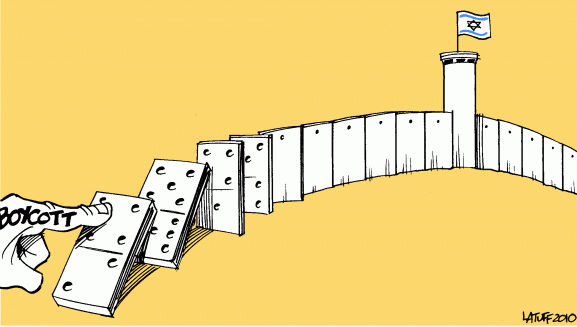
The BDS campaign hopes to cause Israel’s destruction through the domino effect (BNC Arabic website, January 21, 2014).
Omar Barghouti and the BNC website customarily boast of the national Palestinian nature and Palestinian roots of the BDS campaign. They represent the establishment of PACBI in 2004 and the Palestinian call for the BDS campaign in 2005 as the most important milestones in the campaign’s history. While they recognize the contribution of the first Durban Conference to the campaign, they minimize its importance. In their efforts to give the BDS campaign a national Palestinian character they claim the international BDS movement is directed by the BNC.[4] The BNC’s website is called the BDS movement (Bdsmovement.net). The site represents the BNC as the body that coordinates and directs the global BDS movement.
In ITIC assessment, such representations are biased, false and misleading. The Palestinian BNC does not really direct the global BDS campaign and Palestinian BDS activists from Judea and Samaria do not play important roles in it. The BDS campaign, like the entire campaign to delegitimize Israel, is basically a decentralized collection of interconnected networks without a well-defined hierarchy, in which local anti-Israeli activists and networks play central roles.
However, a handful of Palestinian BNC activists are fully integrated into the global campaign and are very active in promoting it in Western countries. Their activities are focused in Britain, which has always been a center for the campaign to delegitimize Israel, and on several other countries in Western Europe.[5] Omar Barghouti is far more popular abroad than among the Palestinians. He is particularly popular among far-left activists mainly in the United States and Britain, where he has become as a kind of Palestinian BDS celebrity.
What, then, is the importance of the BNC and the Palestinian activists and networks participating in the global BDS campaign? In ITIC assessment, the BNC does not lead the global BDS campaign and does not coordinate between the various countries, but rather is one of the many networks operating within the campaign. Its main importance is in allegedly providing the “authentic Palestinian face” of the global BDS campaign. That is an important aspect for the Western BDS activists, because it provides them with the legitimacy to promote the alleged “Palestinian rights.”
The Importance of the BNC in the Internal Palestinian Arena
Omar Barghouti’s claim that the BDS campaign has massive support within the internal Palestinian arena is substantially an exaggeration. While the BNC is supported by civil NGOs and organizations in Judea and Samaria, it has no real social or political influence among the Palestinians.
In reality, the PA and Fatah lead the boycott of Israeli-manufactured goods in Judea and Samaria (See below). In the Gaza Strip, BNC activity and the BDS campaign are barely in evidence. Hamas does not participate in the boycott of Israeli goods, allowing them to be freely and openly delivered to the Gaza Strip through the border crossings, as it is greatly dependent on Israel. As a result, that issue, like many others, has become a bone of contention between Fatah and Hamas. On February 28, 2015, Fatah spokesman Ahmed Assaf stated that while Fatah kept Israeli goods out of the markets in the West Bank, Hamas allowed them to enter the Gaza Strip (Wafa News Agency, February 28, 2015).
On the other hand, Hamas maintains links with networks around the globe participating in the campaign to delegitimize Israel in areas not part of the BDS campaign (See below). They include activists and networks promoting the so-called “right of return,” the most prominent of which is the British-based Palestinian Return Centre (headed by a former Hamas operative). Hamas also has ties to activists and networks specializing in organizing flotillas and convoys to the Gaza Strip (Hamas regards the flotilla campaign as serving its goals of lifting the “siege” of the Gaza Strip and achieving political recognition). Hamas is also connected to organizations specializing in lawfare. Ideologically, Hamas stresses the importance of the path of terrorism and violence (“resistance”) as the main strategy to “liberate” Palestine, and does not place its hopes in the BDS campaign.[6]
The BNC’s Website, Facebook Page and Twitter Account

The BNC Arabic website (Bdsmovement.net, July 2, 2015). Upper right: “Handala,” Naji Al-Ali’s[7] cartoon figure of a Palestinian refugee child which became a symbol of the Palestinian demand for the “right of return,” adopted by the BDS campaign.
BDS Notices on the BNC Website and Facebook Page

Left: Buying Israeli goods finances the Israeli security forces (BNC website, January 19, 2015). Right: Notice advocating the boycott of Israeli-made Ahava beauty products (BNC website, July 8, 2015).
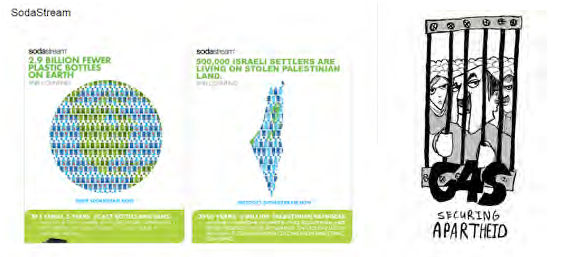
Left: Call to boycott the Israeli company’s SodaStream products. Right: Call to boycott G4S, a British security company (BNC website, July 8, 2015).
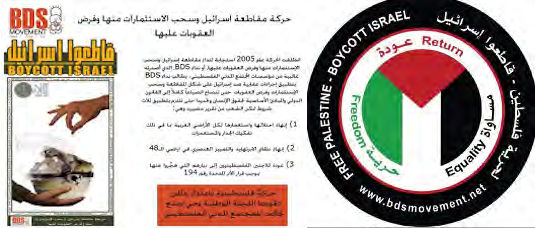
Calls to boycott Israel on the BNC’s Arabic Facebook page. Left: The Arabic reads, “the global Palestinian movement leading the national conference [i.e., the BNC] is the broadest federation within Palestinian society.” Right: In the inner circle next to the slogans of “equality and freedom” is “return,” BDS’s stated aims (Facebook page of the BDS in Arabic).
The Electronic Intifada, an Internet Platform for BNC Activists and the BDS Campaign
The Electric Intifada is a vicious anti-Israel English-language website which supports the BDS campaign and serves as a platform for its activists and ideology. Its webmaster is Ali Abunimah, an American citizen of Palestinian origin. The site went online in 2001 and is based in Chicago.
Ali Hasan Abunimah was born in Washington, DC, in 1971 to Palestinian parents. He spent his childhood in Britain and Belgium. His mother came from the village of Lifta (near Jerusalem) and became a refugee in 1948. His father is from the village of Batir (west of Bethlehem) and in the past was a Jordanian diplomat at the UN. Abunimah has degrees from Princeton and the University of Chicago. He was active in social causes as a student. He published a book called One Country and in 2009 wrote an article entitled “Israeli Jews and the one-state solution,” which rejected the two-state solution. He supports the foundation of one “democratic” Palestinian Islamic (i.e., on the ruins of the State of Israel) which will “directly address the legitimate concerns of ordinary Israeli Jews.” He opposes Zionism, which he says has “grim long-term prospects.”
The Electric Intifada provides a platform for the BDS campaign, especially for its two most prominent Palestinian advocates, Omar Barghouti and Michael Deas (See below). The site posts their articles, which are laced with hate speech against Israel. For example, an article by Barghouti claimed that in 1948 Israel carried out “ethnic cleansing,” Israel follows a policy of “colonialist settlement,” Israel’s security fence is an “apartheid wall,” Israel has imposed a “hermetic siege” on the Gaza Strip that is supported by Egypt, and the United States supports the “crimes” Israel carries out (first posted on October 15, 2012, and still on the site in July 2015).
Funding for BNC Activities
The BNC conducts a variety of activities in Ramallah and Western countries that need regular sources of funding (the salaries of a small staff of activists, the BNC website, expenses of the BNC representative in Britain (including his trips to Europe), Omar Barghouti’s frequent trips abroad, publishing books, advertising, etc.). The BNC is not financially transparent and it does not publicly reveal its sources of funding. Apparently most of its money is donated by BDS activists and networks around the globe, especially the West.
In the second half of 2014, after Operation Protective Edge, the BNC set up a fundraising website (bnc.believe.in). The website vilified Israel at length, boasted of the economic damage the BDS campaign was inflicting on Israel, and then appealed to contributors to “Please support BDS today by making a donation that will help us to make 2015 the year that the boycott movement reaches new heights. It will be a real contribution to the Palestinian struggle for freedom, justice and equality…” According to the appeal, it was the first time the BNC was holding a fundraising campaign. It was the result of both Operation Protective Edge and the global influence of the BDS campaign. Its main achievements, according to the website, were damage done to Israel’s exports, making it difficult for large international corporations to invest in Israel, the withdrawal of funds by large pension funds and turning Israel into a “pariah state.” However, there was still a great deal to be done and donors had to help the BDS campaign become more effective.
The BNC asks for recommended amounts of donations for a variety of goals: help in disseminating propaganda material (propaganda material, stickers, etc.) to help make the campaign more effective ($25); developing the BNC’s website and adding languages ($100); funding “studies” of the “corporate criminals” supporting Israel ($250). The donor can also choose the amount. The ITIC does not have information about the amount of money the BNC has collected so far and the website does not make the data available.
Palestinian Networks Not Participating in the BNC but Integrated into the Campaign to Delegitimize Israel
The BNC is one of the networks participating in the global BDS campaign, which is part of the comprehensive campaign to delegitimize the State of Israel. The campaign to delegitimize Israel is composed of many activists and networks, some of them Palestinian and some of them in other, mostly Western, countries. They specialize in fields such as lawfare, organizing flotillas and convoys to the Gaza Strip, organizing fly-ins to Israel; and promoting the socalled “right of return” of the Palestinian refugees.
In Judea, Samaria and the Gaza Strip there are Palestinian networks that participate in the campaign to delegitimize Israel but are not included in the BNC. Important among them are the Palestinian networks waging lawfare against Israel, which have close connections with anti-Israeli activists and bodies around the globe. Three of the most prominent Palestinian organizations are Al-Haq, headed by Shawan Jabarin and operating in Ramallah; the Palestinian Center for Human Rights (PCHR), headed by Raji Sourani and operating in the Gaza Strip; and Al-Mezan Center for Human Rights, headed by Issam Yunis and operating in the Gaza Strip.
![]()
The Contents of the Report
You can find the Introduction: Main findings and other sections here:
- Introduction: Main Findings. (Read here)
- Section One: The BDS Campaign and Its Roots. (Read here)
- Section Three: Profiles of the Main Palestinian BNC Activists. (Read here)
- Section Four: Comparison of PA and BDS Campaign Positions. (Read here)
![]()
Notes:
[4] On July 2, 2015, Omar Barghouti, the most prominent BDS activist, told Le Monde that the BNC headed the global BDS movement. He claimed it included the trade unions, NGOs, and large organizations and networks representing all the Palestinian workers, farmers, students and youths.
[5] On July 2, 2015, Omar Barghouti told Le Monde that “in comparison [to France], Britain is a paradise for BDS! That is because of the greater awareness of the [British] audience to the Palestinian cause and Israel’s colonial system of oppression.”
[6] A point made by Fayiz Abu Shamala, a Hamas-affiliated Palestinian commentator from the Gaza Strip. In an exceptional op-ed piece called “The boycott [or Israel] will not liberate our country.” He claimed that boycotting Israel would not make it withdraw from Jerusalem or the West Bank, or lead to the “liberation of Palestine.” He said it was a mistake to rely on others and relieve the Palestinians of the task of undertaking the mission [themselves]. He asked [the PA] why they fled from confrontation with Israel and trusted others (Felesteen, June 7, 2015)
[7] Naji Salim Hussein al-Ali was a Palestinian cartoonist assassinated in London in 1987. He was famous for his creation of “Handala,” a Palestinian refugee child who is only seen from the back. Handala became an icon and was adopted by the BDS campaign to mark the so-called “right of return” of the Palestinian refugees Israel.



 RSS
RSS

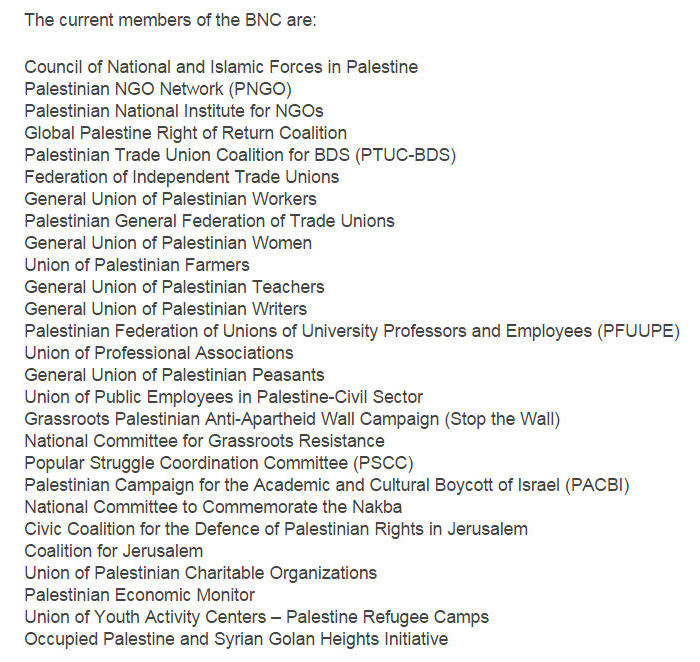

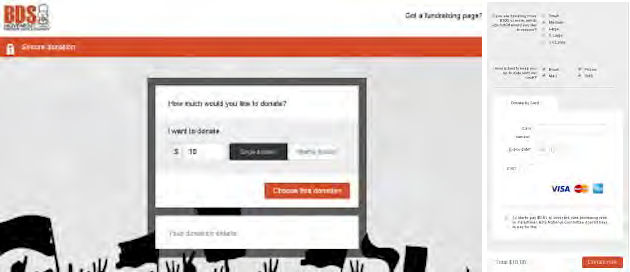
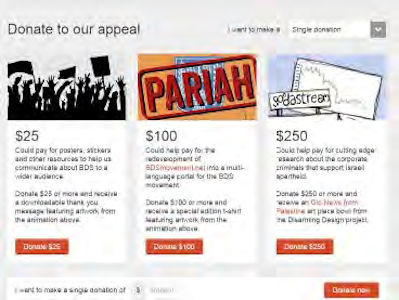
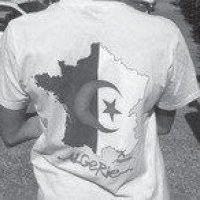
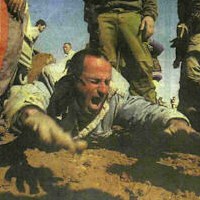

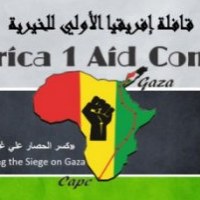
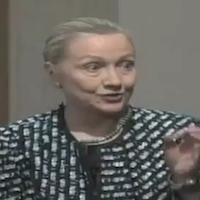




[…] Section Two: The BNC — Palestinian Umbrella Network Collaborating with the Global BDS Campaign. (Read here) […]